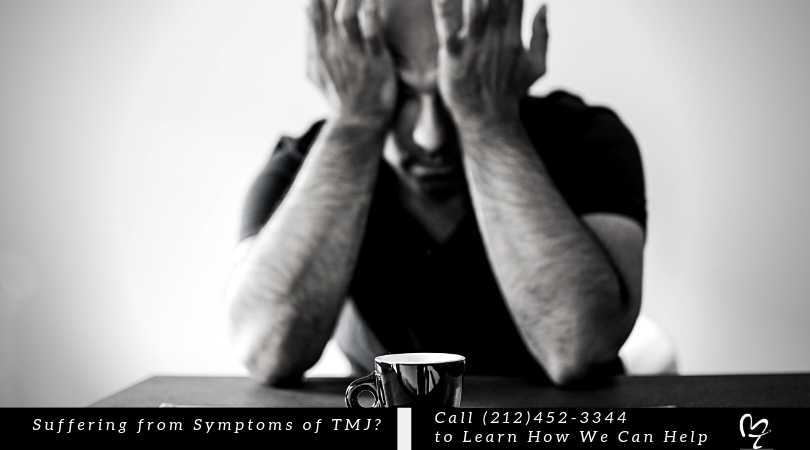Does Caffeine Make TMJ Worse | Manhattan TMJ Treatment
September 6th, 2019 | 3 min read

Caffeine is a staple in many people's daily routines, often used to boost alertness and improve concentration. However, for individuals suffering from Temporomandibular Joint (TMJ) disorders, the impact of caffeine might not be so beneficial.
At NYC Smile Design, we understand how even small lifestyle factors can significantly impact those with TMJ symptoms.
This blog will explore whether caffeine can exacerbate TMJ symptoms, shedding light on how this common stimulant could influence jaw tension and discomfort. Join us as we delve into the relationship between caffeine consumption and TMJ, offering insights and guidance for those looking to manage their symptoms effectively.
What is TMJ?
The term "TMJ" stands for Temporomandibular Joint, which is the joint connecting your jawbone to your skull. This joint, located on each side of your head, enables essential functions such as talking, chewing, and yawning. TMJ disorders encompass a range of conditions that can cause pain and dysfunction in these joints and the muscles responsible for jaw movement. The causes of TMJ disorders are varied and can include factors like arthritis, jaw injury, chronic grinding or clenching of teeth, and anatomical abnormalities. Understanding TMJ is crucial for recognizing how different factors, including diet and lifestyle habits, can impact the severity and management of its symptoms.
Symptoms of TMJ
TMJ is a blanket term for any number of conditions that affect the proper alignment of the jaw. Symptoms of TMJ may include:
- Chronic headaches
- Neck, back, and shoulder pain
- Jaw clicking or popping
- Grinding noises when chewing
- Swelling or pain in and around the jaw
While the exact cause of TMJ is not always known, there are links between jaw misalignment and bruxism (teeth grinding), a condition that is often worsened by too much caffeine. This can be far more noticeable in people with caffeine sensitivities, but even those who can quickly metabolize the stimulant may experience residual effects as it passes through the system – a process that can take six hours or longer.

Does Caffeine Cause Jaw Strain?
Caffeine does not cause jaw strain, nor does it make TMJ worse. However, if bruxism is a contributing factor to your condition, it probably doesn’t help. Caffeine can interrupt sleep and cause general nervousness, both of which can increase risks of jaw clenching and result in discomfort. This effect may be more noticeable immediately following the consumption of products that are high in caffeine, such as energy drinks, but much of that depends on how your body metabolizes the drug.
One of caffeine’s metabolites, theophylline, works to relax and smooth muscles and has a vasodilator effect on blood vessels. This may allow caffeine to relax tense muscles – even in the jaw – as it is metabolized by the body. However, if you are prone to jaw clenching, the initial vasoconstriction effect of caffeine on the system may be more detrimental than its eventual muscle relaxing properties. Again, this has much to do with your caffeine sensitivity and can vary widely from individual to individual.
The bottom line? If you suspect caffeine is having an adverse effect on your health, by contributing to bruxism or for any other reason, try cutting it out of your diet for a month and see what happens.
How can I Tell if I Grind My Teeth?
In many cases, bruxism occurs during sleep. You may be able to tell if you are a tooth grinder if you experience frequent morning headaches or symptoms like ear pain without infection, jaw tenderness, or neck and shoulder pain. If these symptoms are common, it is best to discuss them with a neuromuscular dentist to determine if TMJ is present.
There are some signs of tooth grinding that can be spotted during your routine cleanings and examinations as well. These include ridges on the surface of teeth, recessed gum tissue, and uneven tooth wear. When noticed early on, an occlusal guard may be effective at reducing the impact of tooth grinding, both to the teeth and the jaw. These issues can be discussed as noticed during your biannual visits.
Your TMJ Solution
Understanding the impact of caffeine on TMJ disorders is essential for anyone dealing with jaw pain and dysfunction. While caffeine itself does not cause TMJ disorders, its stimulating effects can exacerbate symptoms like muscle tension and pain. If you suspect that caffeine is worsening your TMJ symptoms, consider moderating your intake and observing any changes. Remember, effective management of TMJ often requires a holistic approach, including diet adjustments, stress management, and proper medical guidance.
For personalized advice and comprehensive treatment options, consult with a dental or medical professional. If you're looking for expert care, consider scheduling a consultation with NYC Smile Design, where our specialists are equipped to help you navigate the complexities of TMJ disorders and improve your quality of life.
Topics:

